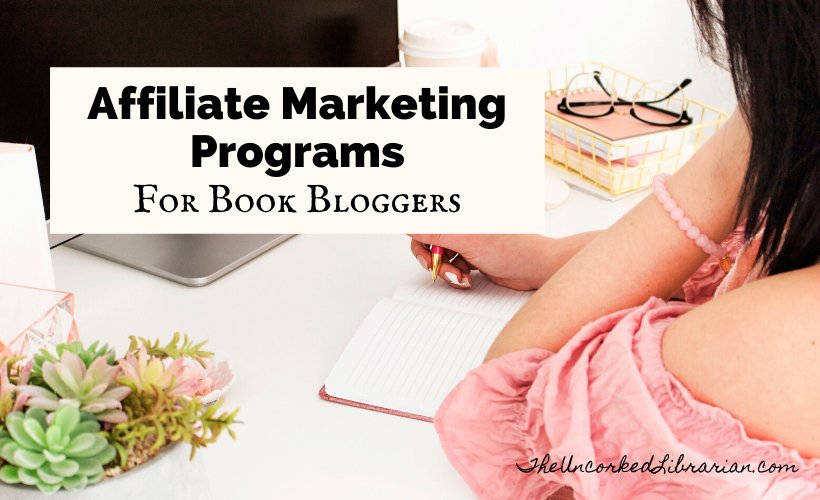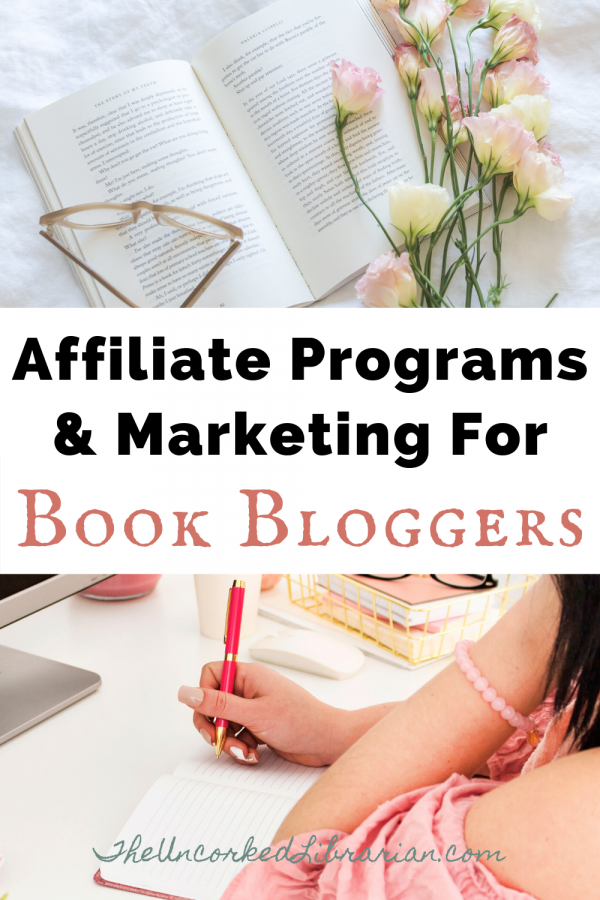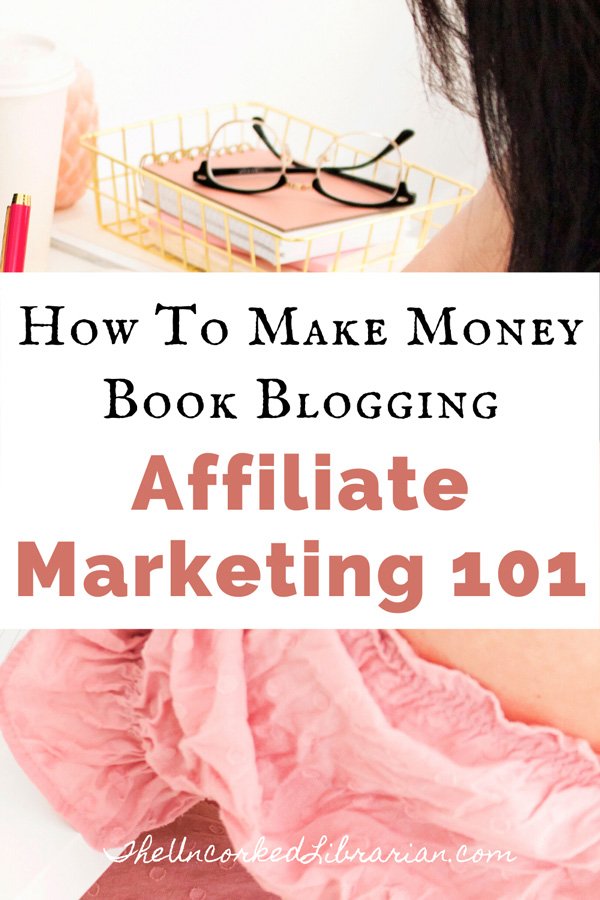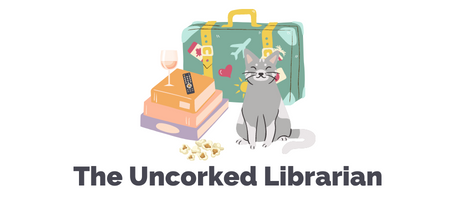7 Book Affiliate Programs: Affiliate Marketing For Book Bloggers 101
This post may contain affiliate links that earn us a commission at no extra cost to you.
Are you wondering how to make money book blogging? Check out our 7 favorite book affiliate programs and learn more about affiliate marketing for book bloggers.

As you know, I am an advocate for living a life of fulfillment and happiness. A life that I am excited to wake up to, am passionate about, and love. For me, this life is about book blogging: helping other bloggers, allowing readers to discover new books, and sharing diverse reads to inspire travel. I want my busy audience to read more and read better.
Growing up, making money book blogging and turning my passions into a remote career seemed impossible. Plus, I was a public librarian with a steady salary. How could anyone make money book blogging?
Through book affiliate programs, that’s how!
What We Recommend
How Do You Make Money Book Blogging?
Within the past few years, I began learning and studying successful bloggers who make anywhere from $10,000-$150,000 a year. Many of these bloggers, freelancers, and digital nomads offer digital courses, sell products and ebooks, have Mediavine ads, utilize affiliate marketing, and secure income through sponsored work.
Affiliate marketing for book bloggers is one of the easiest ways to initially monetize a site along with ads. You can start right away and dip your toes into the cool water of a side hustle or full-time gig.
It’s a lot to learn, though. Right?! At times, the overload of information is overwhelming. Where do you even begin, and how do you find the best book affiliate programs? How do you join these programs and implement them on your site? Are there rules?
This Book Bloggers’ Affiliate Marketing 101 guide will be a down and dirty version of affiliate marketing programs, specifically for book bloggers and book reviewers. Authors can use it, too!
I hope that you find one or two new book affiliate programs and better understand how to incorporate affiliate links into your blog posts. I’ll also briefly discuss disclosing links properly and nofollows–MUSTS for book affiliate links that not all newbies know about.
Let’s get started!

What Does Affiliate Marketing For Book Bloggers Mean & Look Like?
Affiliate marketing is when a retailer like Amazon or Barnes and Noble pays a commission to an external site–like The Uncorked Librarian or your book blog–for sales made on your website.
For example, when I create a book list, I write about the book, upload a picture, and include “buy links” to Amazon. You could also include links for IndieBound, Book Depository, and Barnes and Noble, just to name a few.
Readers who are interested in buying the novel just have to click on the link, and they will be taken to that specific product page. If the reader makes a purchase, I receive a percentage of that sale. Every month, Amazon pays me my commission. Easy peasy!
Here’s an example of how I use affiliate links as a book blogger:

Sex And Vanity By Kevin Kwan
Multicultural Romance | Women’s Fiction | Book Set In Italy & NY
June 30, 2020*
Lucie Churchill is in Capri for a wedding when she meets George Zao. Although she doesn’t understand him, his mother offers to trade rooms. Somehow she finds herself kissing him in the Italian ruins… Years later, they meet again, but Lucie is engaged to someone else. As much as Lucie denies her feelings for George, she cannot stay away. Amazon | Goodreads
Both the title of the book and the word “Amazon” link to Sex and Vanity‘s product page on Amazon. Amazon is one of the book affiliate programs that is not just solely for books. And yes, I earn a commission for almost anything bought via Amazon.
Insider Tip: I find that using product affiliate links versus banners and ads perform better.
P.S. When you utilize affiliate marketing as a book blogger, you have to consider paying taxes (over $400ish in the U.S) and remember proper disclosures. More to come on that later…
You Can Also Take An Affiliate Marketing Course
If you are finding this information overwhelming already, I definitely recommended taking one of my favorite blogger’s Affiliate Marketing courses.
Cate, from Sweet and Simple Life, will teach you everything you need to know about affiliate marketing. She goes deeper into programs with videos and gives you secrets to success. I’ve taken two of her courses, including Becoming A Blogger.
Cate is also giving my blog readers 40% off her courses. Just use TUL’s special code UNCORKED40 here (make sure to click the little Promo link). This discount code works for her blogging and Pinterest course, too.
OK, so what are some of the book affiliate programs that I’ve used, recommend, or know other book bloggers love?!
Here we go!
7 Affiliate Marketing Programs For Book Bloggers
These are 7 book affiliate programs to help you make money book blogging. Please know that these are not all of them and new ones pop up all of the time. If you want to work with a specific company and you cannot find an affiliate program, it never hurts to reach out or even pitch your business proposal to them.
1. Amazon
Amazon is where I first started monetizing my book blog. Signing up for the Amazon Affiliate Program takes mere minutes. They have a variety of banners, product links, and promotions that are easy to integrate into your site.
One affiliate feature that is perfect for book blogger affiliate links includes Amazon’s Native Shopping Ads (these are already nofollow links, too–more to come on that). Here, I created a quick “Books Set In Italy” list/ad:
Amazon makes cutting and pasting affiliate links easier than any other program I’ve used. You can quickly track your income report. How much commission you make is based on what type of product you sell, and what promotions they are running.
Even if you don’t sell the exact item that you are promoting, Amazon retains cookies for at least a day and counts any other sales within that period. THAT’S A HUGE BONUS. Amazon is versatile and popular, and they have a plethora of products.
Must-Knows With Their Affiliate Program:
- You must make a specific number of sales within a designated time period for official Amazon Affiliate approval. If you fail to make those sales, you can apply again, but you can no longer earn money from old links. You would have to change them out.
- Amazon is strict about who uses your links. They monitor for friends and family—and will not count any IP addresses that look like yours or someone who knows you. They may also check page engagement times: If other bloggers are helping you out, the sales with immediate link clicks and purchasing of unrelated items within seconds may get flagged.
- At this time, you also cannot directly post Amazon affiliate links in newsletters or some social media platforms like Pinterest. Links must be embedded into a relevant post. I highly suggest reading their terms and conditions before starting. Even pro bloggers have gotten kicked out years later for breaking a rule.
- Payout starts at $100 for checks. Just an FYI. I do direct deposit.
Sign up for the Amazon Affiliate Program.
2. ShareASale
ShareASale is another popular affiliate marketing program for book bloggers (and all niche bloggers). A part of Awin–that’s up next–ShareASale is currently operating independently. Many book affiliate program lists leave off Share-A-Sale, but ShareASale has SO many hidden gems.
Unlike Amazon, you apply for companies that you wish to promote products for. Each company approves or denies you. If you get denied for one, you have hundreds of others to choose from.
Etsy (U.S.), Dollar Tree, and Wayfair are just a few companies tied to ShareASale. These affiliate programs are good for book bloggers if you blog about bookshelves, home library design, and book gifts–not just physical books.
I also use ShareASale for ‘how to book blog’ posts. I am an affiliate for the popular Pinterest scheduler-Tailwind, my pretty blog theme-Restored316, and grammar editor-Grammarly.
The minimum payout is $50 monthly once you start making sales. I won’t lie, either: ShareASale is one of the harder book affiliate programs to learn and get used to. Once you do, it’s pretty fast!
Join the ShareASale Affiliate Marketing Program.
3. Awin
Awin.com is actually a UK based affiliate program with some of the cutest stationery companies I have ever seen. Think gift guides, again, y’all.
Awin boosts of Etsy for non-US users, and like ShareASale, links to a variety of programs and companies that you apply to on an individual basis. For book affiliate programs, I use Amazon, Awin, and ShareASale the most.
Somewhat of a pain but to show good faith, when you apply for Awin, you have to pay $5 upfront. You immediately get this back upon finishing your application and approval. Additionally, you need to upload your own W-9 from the IRS website.
You are responsible for reading each program’s rules to see where you are allowed to post your links. Unlike Amazon, some programs will let you post direct affiliate links anywhere you wish.
Here’s one example of how I use Etsy via Awin for gift guides:
Join the Awin Affiliate Program: Awin.com
4. CJ Affiliates
CJ Affiliates is formerly Commission Junction. Like many other affiliate programs, CJ Junction offers a variety of businesses to apply for and choose from like Trip Advisor and Barnes and Noble.
One of the largest networks, they payout monthly. You must make a sale within 6 months or they boot you out of the program.
CJ Affiliates has a deep link generator plugin for your Internet browser (kind of like the Pinterest Pin or TW scheduler). Affiliate users can quickly head over to Barnes and Noble, find the book they want to pair with a review, and instantly generate an affiliate deep-link to drop in a post.
You can join CJ Affiliates here.
5. Book Depository
Book Depository offers millions of books from all over the world, including titles from indie authors and publishers. They also provide free delivery to over 100 countries. With over 19 million titles, you cannot go wrong.
Joining their affiliate network is free, affiliates earn 5% on all sales, and there are monthly payouts. They show your earnings in the pound but will convert your sales to dollars when they payout. You can also join them via Awin, which might be easier if you want to consolidate. I used to use Book Depository separately but now have them connected via Awin.
Sign up for Book Depository.
6. IndieBound
Although I have cut back on my book affiliates–I had too many–I used to use IndieBound. IndieBound works with independent sellers and bookstores. They launched in 2008 by the American Booksellers Association.
IndieBound, honestly, was the least productive book affiliate program for me, but I loved the indie aspect.
Join the IndieBound Affiliate Program.
7. BookShop
BookShop has recently entered my book affiliate program radar, but I haven’t sign-up yet. However, I do know a ton of book bloggers who are enjoying BookShop and see it recommended in my Mediavine group.
BookShop promises book bloggers 10% commission. They are all about supporting local and independent bookstores. Uniquely, you can curate book lists in your affiliate account–think back to my Books Set In Italy example–that encourages your readers to easily make more purchases from a book list.
Please note that, currently, BookShop is a US-only program. Sign-up for the BookShop Affiliate Program.
Additional Book Affiliate Programs For Book Reviewers & Book Bloggers:
Skimlinks
AudiobooksNow
BooksAMillion
AbeBooks
eBooks.com
What You Need To Know About Using Book Affiliate Programs Legally & Ethically
One of the things that no one told me about book blogger affiliate marketing was how to use affiliate links ethically and legally. I’m talking properly disclosing that you are using affiliate links, nofollow links, and paying taxes on earned income.
I am not a professional lawyer or *anything* so please take the following information as non-professional recommendations and do your own due diligence/research, too.
3 Musts With Book Blogging Affiliate Marketing:
1. You Must Disclose Affiliate Links At The Beginning Of Your Post
Far too often, you will see bloggers post affiliate links and disclose at the end of a post. Before those affiliate links appear, you must tell readers that you are earning a commission from purchases. There are FTC guidelines that you should review before using affiliate links and doing sponsored work. This applies to IG, too.
This is my disclosure statement located immediately under my blog title:
This post may contain affiliate links for products and services I recommend. If you make a purchase through these links, at no additional cost to you, I will earn a small commission. Read the full disclosure here.
Please note that Amazon has its own rules and statement elsewhere.
2. All Affiliate Links Should Be Marked As Nofollow Or Sponsored
I learned this later in the game and felt like an idiot. Google will penalize you if they discover you are promoting affiliate links and sponsored products/trips without alerting their crawlers and readers. Any affiliate link must be designated as such. What and how?
I’m not going to over-explain this one. Just make sure that in the HTML code for your actual affiliate link, you type: rel=”nofollow”. You have to manually input this after the line that reads: target=”_blank”. Don’t use a plugin…when the plugin dies, so do your nofollow links. If you use Gutenberg, they just added slider tabs for sponsored and nofollow too.
3. If You Earn Over A Particular Threshold, You Have To Claim That Money On Taxes
In the U.S., if you earn over $400 from your book blog, you are no longer a ‘hobby blogger’ in the eyes of the government. You want to research how to pay taxes.
Since I am considered self-employed via my book blog, I make quarterly payments directly to the IRS. Y’all, I suck at taxes, currently use Turbo Tax, and will most likely higher an account one day. But still, I pay taxes on my blog.
You can read more about self-employment taxes and why I registered my blog as an LLC here→
A Note About Self-Hosting For Affiliate Marketing
Back when I created my hobby blog for The Uncorked Librarian, I used wordpress[dot]com. I bought a pretty theme, and I paid for the cheapest hosting plan. The .Com version of WP will not let you fully utilize affiliate marketing. You will find limitations to what types of ads you can create.
For that reason alone, I switched to self-hosting through SiteGround and wordpress[dot]org. I’ve been with SiteGround for years and love them. You have more control over your site for placing ads and affiliate links and adding plugins. SEO will be easier and better, you can pick any blog theme, and your site will run faster to make Google happy.
SiteGround is also affordable with 24/7 customer service via their online chat. Upgrade to SiteGround today here. I look at SiteGround as an investment, and my affiliate marketing sales pay for the cost of hosting.

Are You Ready To Make Affiliate Income Book Blogging?
Although this is the short and condensed version for how to make money blogging via affiliate marketing for book bloggers, I hope these book affiliate programs and tips get you started as a new or even more experienced blogger.
I went for almost a year without adding affiliate links to my book reviews. I feel like a schmuck. Even with just Amazon alone, I could have been earning passive income. Adding links takes seconds.
What Questions Do You Have About Book Blogger Affiliate Programs?
Do you have any questions? What other ways do you hope to grow your book blogging business?
I’d also love to know what favorite companies you use on each of these larger affiliate program platforms. Please let me know in the comments.
You May Also Find These Other Book Blogging Posts Helpful:
Blogging About Books: All You Need To Know About Starting A Book Blog
Bookstagram 101: How To Create A Killer Bookstagram
Our Favorite & Most Recommended Blogging Resources
70 Engaging Book Blog Post Ideas
Photoshop 101 For Book Bloggers
If Your Goal Is To Make Money Blogging, Don’t Miss:
Why Register Your New Blog As An LLC
How To Increase Your Blog Traffic

Christine Frascarelli
Christine (she/her) is the owner, lead editor, and tipsy book sommelier of The Uncorked Librarian LLC, an online literary publication showcasing books and movies to inspire travel and home to the famed Uncorked Reading Challenge. With a BA in English & History from Smith College, an MLIS from USF-Tampa, and a U.S. Fulbright Fellowship in Christine's back pocket, there isn't a bookstore, library, or winery that can hide from her. Christine loves brewery yoga, adopting all of the kitties, and a glass of oaked Chardonnay. Charcuterie is her favorite food group.


I found this post super helpful as I’m looking at signing up to be an affiliate. I do have a question, though…my blog isn’t “officially” an LLC or a business or anything, so I feel weird signing up as though it is. Can you point me to any place that gives advice on how to go through proper channels for that? Or do you have any advice from your personal experience? Thanks in advance!
Hey Christina,
Thank you!
So, you don’t have to have an LLC or a ‘business’ to apply to be an affiliate for the above programs. You would just apply with your blog as is — many people do that. The only thing that you have to keep in mind is paying your taxes on that affiliate income if it’s over a certain threshold (usually $400 if you live in the U.S.).
I have a post that talks about LLC for blogs here: https://www.theuncorkedlibrarian.com/turning-your-blog-into-a-business/. (Please just remember that I’m not a professional, and this is all my experience and opinion.) I hope this helps! I try to update both articles every year.
Hi Christine! If you ever do another update of this article, would you consider adding my bookshop’s affiliate program? My name is Nyasha Bryant and I own the online, independent bookshop called missreadbooks.org. It’s geared towards BIPOC women and non-binary folk who enjoy empowering, magical, and adventurous books. I would absolutely love to spread the word about my shop’s affiliate program. Commission is 5% and the discount code is 15%, similar to the Book Depository.
Hi Nyasha,
I approved this comment but removed your more private contact information (email address) so that our readers may check out your book affiliate program at their leisure/discretion and contact you via your website. Thank you for letting us know! We appreciate it!
wow so glad I read this lol I’m currently having the same “schmuck” feelings that you had! thanks for the info!
Haha. Blogging is definitely a learning curve. You are so welcome!
Hi
I am sooo happy I stumbled upon your page,
What a great post.
I am so new at this, I have only started my website a few weeks ago through a course, and I was not aware of the disclosures having to be at the beginning.
Thank you so much for sharing your experiences.
All the best Colette
Hey Colette. Thanks so much! Yes, disclosures are incredibly important as part of following FTC guidelines and ethical blogging and social media practices. There’s definitely a lot to learn about blogging legally — it’s tricky. Nofollow and sponsored links are important, too.
I’m definitely on the fence about switching my blog over to a fully hosted one since mine is a wp.com right now. And I’m not about to pay the $300/year in order to put up affiliate links! But I will miss the community aspect of wp.com!
It depends on what your goals are (to make money, have readers, etc), but basic blogging 101 is going self-hosted. Imagine if every full-time, side-hustle, or 6-figure blogger said they didn’t want to pay $300 to host a year.
It’s like saying that you are starting an ice cream shop but don’t want to pay rent for your shop, buy ingredients to make the ice cream, or scoops to scoop it out. If you want to make money blogging (big or small), you have to treat your blog like a business and invest in it and yourself. If you are just blogging for a hobby and don’t care if anyone reads it/don’t want to make a cent, then that is different (but this is a post about how to make money book blogging).
You will still have a community self-hosting. People can comment, sign-up for a newsletter, join a FB group you’ve created, follow on social media… I have a huge and engaged community as a book blogger. My experience with WP .com is that it basically creates a false community of bloggers follow for follow-ing other bloggers. It’s unlikely your true target audience and readers live on WP .com unless you are only targeting other novice/hobby bloggers. There is nothing in the ‘reader’ that you can’t replicate via an RSS, newsletter, SM, or just visiting your favorite blogs.
I just stumbled across this post. I have been researching book affiliate programs. I share so many recommendations, more on instagram than on my actual blog, but was hoping to affiliate myself with one. I signed up for Book Depository a while back and that hasn’t yielded anything. I was keen to learn about the Amazon affiliate program, but if they are restricting friends etc, wouldn’t it be hard to do?
Do the affiliate links have to be posted on the blog? Or is instagram ok?
I don’t really use Book Depository much anymore since after hosting a book blog for two years, all of my readers seem to prefer Amazon. I dropped Barnes and Noble, too, since my readers were never buying from them.
Most of my friends and family don’t follow my book blog so as long as your blog/SM has a target audience (which honestly shouldn’t be your friends if you are trying to make money from it, have a side hustle, or are a part or full-time blogger), you should be able to easily make a little affiliate income from Amazon’s program.
I wouldn’t personally post affiliate links on IG (and you would need to double-check where you allowed to post affiliate links per program – not all let you post on social media and/or you have to add that site into your approvals; plus you would need to fully disclose in front of that link) — as I don’t see a ton of click-throughs on IG, even to the blog. I know that you can do Amazon links on FB, but again, for me, that isn’t a strong place to market them. You really need an invested audience, and for me, my readers invest on my blog first. Most people go on IG to look at pretty pictures, get information, and occasionally purchase (but not from Amazon). At least that’s my personal experience.
This was really helpful I’ve only been blogging for a few weeks and am just starting to add in affiliate links into the few posts I have on my site.
I didn’t get accepted by Amazon due to not having enough on my blog but I did get Whsmith and Book Depository.
I have a few followers on insta already just by following a few people.
I can already see that book blogging is a community 1 following on insta got me about 4 followers.
I’m also using site ground land wordpress and after having a few problems setting up I’m now getting into it and about to start advertising my blog more.
Hey Tianna, I am so glad that this book blogging affiliate post was helpful for you. You can always re-apply for Amazon when you start having more blog posts and traffic. It’s exciting to watch your social media accounts and blog slowly grow–enjoy every second and best of luck to you. SiteGround is the best–I love them and highly recommend them. I’ve been with them for years. I love book blogging, and I hope you will love it too. Thanks so much for stopping by and letting me know.
This is so helpful! I’m new to this blogging gig and it can be a bit overwhelming trying to figure it out!
Thank you! I definitely hope that this list/guide helps. Blogging takes a lot of time to learn everything–it is SO overwhelming at times. I feel ya! It’s totally worth it in the end. Never hesitate to ask if you have any questions.
You are the BEST!! I was just talking to my husband (aka, my IT department) about how I think I’m ready to start monetizing my blog. Just to see how it goes! But, it is overwhelming when it comes to picking a place to start. I’ve done some research here and there, but this post really helped give good details about programs, especially for us book bloggers. Thank you so much for all this info!!! It’s a great starting point.
Out of curiousity — do you know anything about how paying taxes on blog income works? I used to do freelance work, and the paperwork needed to file for “freelance” or “home business” taxes is brutally expensive. This is one of the reasons I’ve been reluctant to start monetizing; I don’t wanna pay $300 for paperwork for my business that’s only bringing in $3 a month, lol. I always see so much about making money from blogs — but not about how to handle taxes! If you know of any good place for info on that, I would be grateful for the links! 🙂 Thanks!
Thank you so much! It is so overwhelming–I am not going to lie. I did A LOT of research, and I have been trying new tactics. I also started taking more online courses and watching youtube videos. I am glad that you found this helpful.
So if you are a freelancer, you know about self-employment taxes and reporting, which I am just learning. This is how I became a LLC: https://www.theuncorkedlibrarian.com/turning-your-blog-into-a-business. As you probably know, a single member LLC operates like a freelancer but you have different asset protection (or so a casual lawyer told me). The only real difference is that someone would sue my blog and not me. The $300+ in paperwork is worth it for me because I don’t want to get personally in trouble because I thought I had permission to use a book cover when I didn’t…or something like that. Leave my wine fund alone! If you make more than $400ish (don’t quote me–I am not a professional tax person or lawyer), than you went from hobby to business and officially have to pay taxes. Most of these affiliates ask for a W-9. They track a lot for you too. To be safe, my husband bought Turbo Tax for small business this coming year. I’ll let you know if it was the right choice. I am still trying to figure out all of the taxes, honestly. I just started making money and fully using these affiliates. I have Excel sheets with expenses and income. If I make more (which I haven’t but hope to next year), I’d honestly go see an accountant or at least call my local business resource center to make sure that I am doing taxes 200% correctly. Hope that helps! I’ll keep you up to date as I learn.
This definitely helps a lot! Thank you for sharing all these candid details. Also helps to know that the general “hobby” threshold is around $400. I saw your other comment above about how much you actually had to invest into the blog before being able to start trying to make money (LLC, etc). That is crazy, and all that stuff never even occured to me. I never seem to think of this as “this is starting a business”; it’s always “this is a hobby that may bring in extra cash!” But the former is a reality, and one I definitely need to do a lot of research in before I decide I’m ready to jump in. Thanks again for sharing all your experiences thus far!!
No problem! I think that you can definitely turn your blog into a little side hustle without too much worry. There are plenty of bloggers who don’t go LLC yet bring in minor affiliate income. I am going to look at selling courses, books, and products–so for me, LLC status made sense to jump right on board as a business. Honestly, the expense also motivates me to make all of it back ASAP. You can probably be OK just monetizing with links by making extra sure to have solid Privacy and Disclosure Policies, etc. You could seek some free volunteer lawyer advice in FB groups and such.
Great breakdown of .com vs .org! We’re so glad we went with .org and self hosting. It makes a world of difference!
Need to check out ShareASale. Not that we’re anywhere else to being able to monetise since our page/site views are still abysmally low. Oh, but one day… *sigh*
And yeah, Amazon is insanely strict. I find it so ridiculous that you might be penalised for a friend or family member seeing something you advertise and GENUINELY wanting to buy it. So long as it’s not you (which some affiliates allow, but I can understand why they wouldn’t), honestly don’t get why it’s such a big deal. Especially since everyone complains how low Amazon’s commission is, as well! Still, we endure…
Thank you!
I needed that .com vs .org lecture long before I wasted some cash on themes for the wrong platform. WP .com asks why you are leaving, and the answer is DUH….they really do have false advertising. You can’t truly monetize with .com, even though they pretend that you can.
I first started with ShareASale because of Tailwind–which has tenfold made a difference in my blogging traffic. My page views are slowly getting up there. I’d love to be at 10,000 a month before Dec. I’m learning that I do have to write more posts that sell for my audience.
Commission cracks me up sometimes. Someone used my Barnes and Noble affiliate links for almost $50 in books; I received 48 cents. I just got 4 cents off of an ebook sale on Amazon. I am still hoping to master affiliate marketing as passive income. Bloggers make $1,000 a month from it alone, if not more. It’s wild. I need to organize my affiliates. I recently started applying for everyone–indiv. programs payout more.
I just starting using Amazon Affiliates but don’t really know if I’ll get anything out of it just yet (I just joined because I saw you do it and it’s free) – I really need to read up on it more I think! Great advice about Wordpress I will also look into that too. I really want to make my site more professional but feel like I can’t start anything until I’m earning a full-time wage. Its all excuses, I’m scared to commit after my travel one failed!
I literally just got paid out by Amazon today…I calculated how much they made in four months vs me. Then I laugh-cried. GAHAHA–it’s a bit wild, really. I’ll be sure to use your links when I purchase–we (blogger friends and I) noticed that Amazon is incredibly strict about ‘friends’ and watches engagement and such. Half of the customers’ purchases from my site aren’t counting, and seriously, I have NO idea who these people are making the purchases. They aren’t friends, family, or bloggers that I know, especially based on what is being purchased. I messaged Amazon to see what was up and all they said was that they block IPs from friends and family. I jokingly wrote back how I must have secret admirers and blog followers lol. But seriously, they must look at time spent and other factors–that are incredibly strict. I can’t complain because Amazon still brings me cash, and they are really great: easy to work with, tracks everything for me, and are universal.
I feel you about not wanting to spend a lot of money up front too. I think I dished out at least $700 (I do keep track for taxes) in start-up costs. Hosting, Adobe, LLC protection…you name it… I am determined to make it work, but I am definitely terrified of failing. At the end of the day, I just remember that I enjoy it, it will take time, and I can always add and try new things. New businesses rarely get out of the red in the first year. I am learning a lot for sure.
Great guide, Christine! Checking out CJ Affiliates for the B&N affiliates. I don’t mind not making money from my blog since it is a hobby, but this is a great way to try and help offset the costs of hosting. I may move over to self-hosted next year when my year with .COM is finished. Honestly the only thing that I am annoyed about is not being able to use Google Analytics :/
Monetizing is definitely is a great way to offset self hosting fees. The first year of self hosting is super cheap. I’m a little worried about the following year, but hopefully, my affiliate marketing will cover it. Thank you! Self hosting works well for SEO ranking, etc, too—but something tells me you know all of that ? I do love Google Analytics—can you use Google Search Console or no?
Thank you for posting this! I have been wanting to monetize my blog for a while now but I didn’t know how to go about it especially since I don’t get many views yet.
I read that it’s always good to lightly monetize from Day 1. With lower views, I would not place ads everywhere (that’s just annoying and loses people’s trust), but a buying book link is great! I hope this post helped, and never hesitate to ask questions if you get stuck (I got stuck on a few affiliates myself at first). Amazon is a great starter affiliate as they are easier to figure out.
Great post! I totally think that running a business should count as exercise. 😀 It seriously feels that way blogging sometimes. 😉
I’d be so dang skinny! ?? Thank you!!
This is an extremely helpful post. I’ve been trying to find the best way to monetize my creative writing blog while incorporating book reviews. Thank you! I will be sharing this on Twitter and Pinterest.
Thank you!! Thank you for sharing too! If you ever get stuck, never hesitate to send me a message.
Great list! I use the same exact affiliates! The only difference is that I use Elegant themes. Great post! =)
Thank you! I also use Skimlinks on the rare occasion, but I am undecided how I feel about the platform right now. I did get denied for Trip Advisor on CJ Affiliates–so Skimlinks lets me earn a little commission through them instead. Awin is the one platform I am trying to get better with.